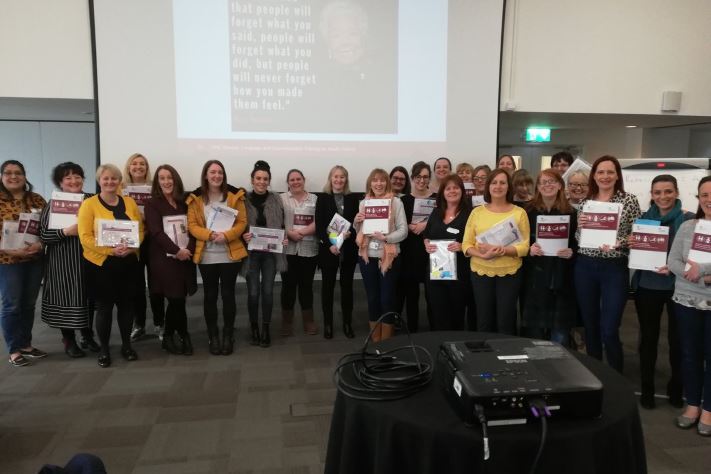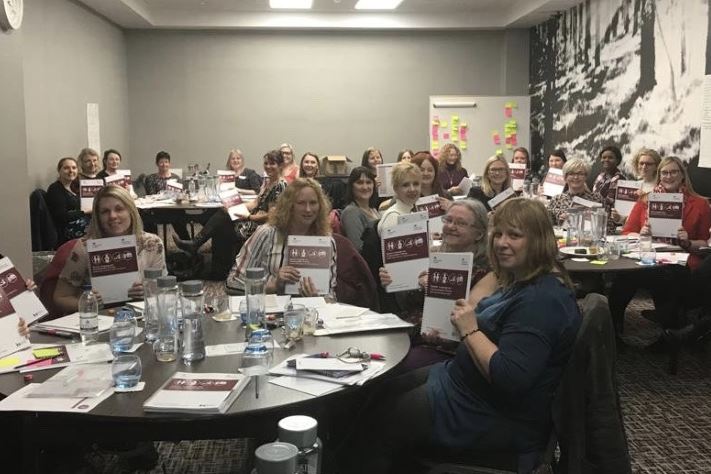27th March 2019
A guest blog by Wendy Nicholson MBE, National Lead Nurse Children, Young People & Families, Public Health England, on the roll out of new training to help health visitors promote healthy speech, language and communication skills in the early years.

Wendy Nicholson MBE, National Lead Nurse Children, Young People & Families, Public Health England
Health visitors will be well aware that having the right speech, language and communication skills is a crucial foundation for a child’s lifelong learning and achievement.
Not only does having a speech, language or communication need affect a child’s day-to-day life. If undetected and/or unaddressed, it can have a big impact on their future health and wellbeing.
For instance, children with these needs are more likely to be educationally and economically disadvantaged and are at greater risk of developing mental health issues later in life.
Research shows that children with poor vocabulary skills at aged 5 are twice as likely to be unemployed when they reach adulthood.
Widespread issue
Right now as many as 1.4 million children and young people across the UK are known to have at least one speech, language and communication need, for example delayed language or a language disorder associated with another condition such as autism or hearing impairment.
And the real number is expected to be much higher given that children’s needs are often undiagnosed. As many as four in five (81%) children with emotional and behavioural disorders are thought to have a need that is unidentified.
This means that thousands of children are currently not receiving vital support that could prove a decisive factor in shaping their future for the better.
This is also an area where huge health inequalities persist. Around half of children living in disadvantaged areas are affected by speech, language and communication needs, compared with one in ten of the general population.
Health visitor training
There is a clear opportunity to do better when it comes to supporting children with the skills they need to reach their full potential, especially in communities where we see higher levels of deprivation.
At Public Health England, we are addressing this challenge by working with the Department for Education (DfE) and the Institute of Health Visiting (iHV) to roll out new training to help health visitors promote healthy speech, language and communication skills in the early years.
We know that health visitors hold a unique relationship with parents and play a hugely important role supporting children in their first few months of life.
This new training will support health visitors to make an even greater impact when assessing speech, language and communication needs and identifying problems early on.
It will offer guidance and best-practice around signposting and making referrals to Speech and Language therapists, to help ensure children get the right support when they need it.
The training has recently begun across 46 Local Authorities in the north of England. By the end of April 400 health visitors will have attended a one-day training course that they can then roll out across local teams. From May this year we will be offering the training to more local areas, enabling more families to benefit from the specialist support that health visitors provide. Following this second phase, the training will be rolled out to the wider early years workforce, including nurseries and early years practitioners.

SLC training for HVs in Manchester

SLC training for HVs in Leeds
This training is just one of the ways in which we are working to close the word gap between 0 and 5.It is happening as part of a wider cross-government ambition to halve the number of children not achieving their expected level of development at the end of their reception year, by 2028.
In addition to the health visitor training, we are also working with the DfE to develop a new model speech and language communication pathway for children aged 0-5 years, to be used by health visitors, early years practitioners and speech and language therapists. This will improve referral pathways to ensure children receive timely and appropriate support.
We are also working with Newcastle University to develop an early language assessment tool to help identify children that may benefit from additional support. The tool, initially being trialled in Derbyshire, Newham, Middlesborough, Wakefield and Wiltshire, will support health visitors’ professional judgement in spotting concerns about children’s skills. Designed to be quick and easy to use, it will be trialled for the first time this summer and rolled out nationally in 2020.
We look forward to keeping you updated on our progress in helping more children get the very best start in life.
Wendy Nicholson MBE, National Lead Nurse Children, Young People & Families, Public Health England





